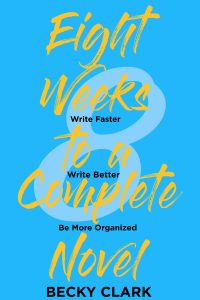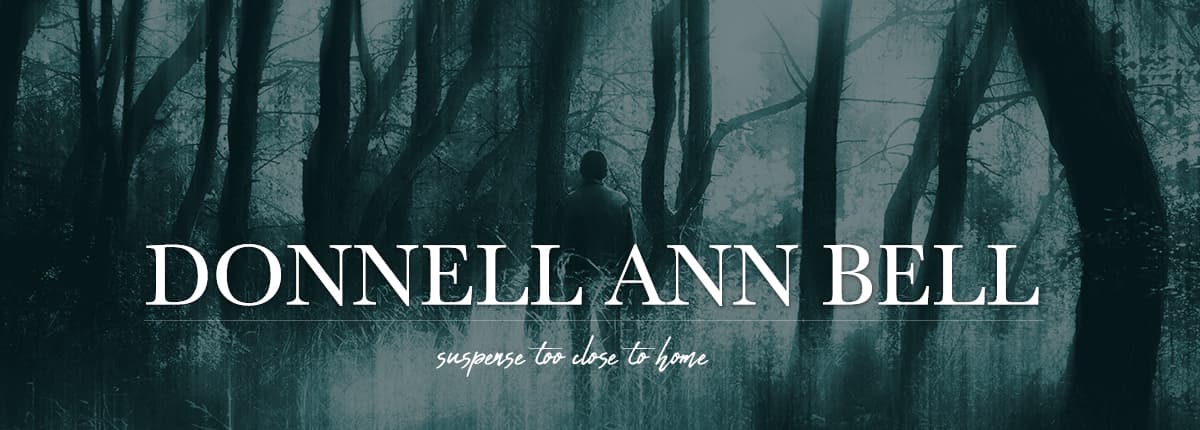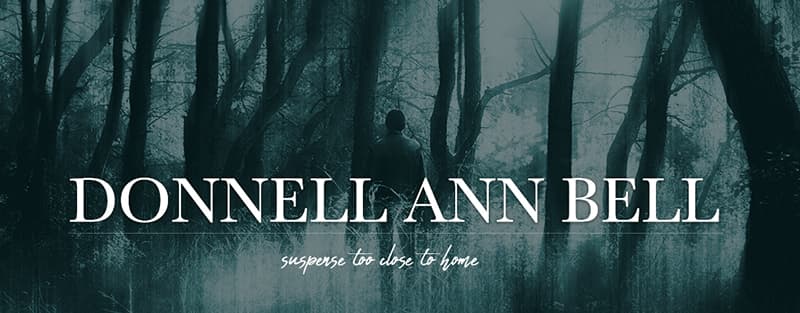
Friends, My guest today is the incomparable Becky Clark who puts the “pro” in prolific. Every writer on the face of the planet strives to produce a quality product in a timely fashion. Becky is here today to give you a sample of how to make that happen from her excerpt of Eight Weeks to a Complete Novel. ~ Donnell
By Becky Clark
Excerpted from EIGHT WEEKS TO A COMPLETE NOVEL—WRITE FASTER, WRITE BETTER, BE MORE ORGANIZED

Author Becky Clark
I feel my clock ticking. I came late to the writing game, took my sweet time to learn the ropes, changed genres, been orphaned by a publisher, kept having birthdays. I was overflowing with stories and needed to get those words on the page faster, so I found some guaranteed ways to speed up my writing.
It sounds woo-woo, but you have to believe you can write faster. Until somebody broke the 4-minute mile, nobody believed it could be done. Now everyone but me is breaking it. But you also can’t rush out and run a marathon simply because you believe you can. You have to work up to it. Get some systems in place for training. Build up those muscles and habits.
 The other thing you must believe, if you want to write faster, is that you’re not twelve years old. (Unless you, dear reader, actually are twelve years old. Then carry on being twelve and writing those novels. You rock!) But if you’re not twelve, turn off your phone, social media, and other distractions. There’s nothing so important it can’t wait until you’re done with your writing for the day.
The other thing you must believe, if you want to write faster, is that you’re not twelve years old. (Unless you, dear reader, actually are twelve years old. Then carry on being twelve and writing those novels. You rock!) But if you’re not twelve, turn off your phone, social media, and other distractions. There’s nothing so important it can’t wait until you’re done with your writing for the day.
Learn how and when you work most efficiently. I’m an early bird, so I assumed I’d be able to write in the wee hours. Spoiler alert— I couldn’t. But I wouldn’t have known that without trying it a few times. Experiment over the course of a couple of weeks. Try writing at a coffee shop if you usually write at your desk. Try getting up early to write, or stay up late and write after your household is asleep. Try writing sprints, or one hour of focused writing.
Be sure to keep meticulous notes during your experiment: when, where, and how many words you wrote, at the very least.
But don’t tell yourself, “Oh, I tried that before and it didn’t work.” Unless it was yesterday, understand that you are a different person and writer today. What worked—or didn’t—may not be valid anymore. Check to be sure.
Some people can work in short bursts of time. I’m not one of them. I like longer blocks of time to write, but maybe that’s just because I have longer blocks of time to write. Luckily, I learned how to make use of the surprise minutes that came my way.
of them. I like longer blocks of time to write, but maybe that’s just because I have longer blocks of time to write. Luckily, I learned how to make use of the surprise minutes that came my way.
When you’re waiting for an appointment, or in line somewhere, or stuck in traffic, you can still be productive. Use those times for brainstorming. Pick a specific topic: a plot hole, how to get a character from here to there, blocking a fight scene. Or spend time filling your “word bank” with thematic words and phrases to be sure to use in your manuscript. Then when you sit down to write, you’re ahead of the game, knowing how to proceed in your story.
Let’s talk for a minute about word banks.
When you have a theme or setting important to your story, you can do this very cool subliminal thing where your word choice slyly reminds your reader about it.
If your story has a Japanese theme, you’re going to want to describe your character’s eyes as the color of jade; or see her going through a gate as imposing as a Shinto shrine, or trying on a dress as tight as a kimono, or slicing a loaf of bread with a knife the size of a Samurai sword.
Maybe your book involves a marching band. Even when the characters aren’t performing, they’re walking with precision, or they’re in tight formation, or the anger in her voice is percussive.
If you want to show that your character is tender-hearted without having to say it all the time, curate a list of words that evoke puppies or kittens or comfort food or whatever you have in mind to evoke that sort of feeling in your reader.
Then withdraw from your word bank during your editing and polishing phase, to subliminally remind your reader that you’re in the world of marching band, or Japan, or wherever.
It’s very effective. You don’t need to be heavy-handed about it, but these lists will serve you well. And you can create them in ten-minute brainstorming sessions. It’s a super-productive use of your time, especially when you write a series and can refer to them over and over again. You can also use them to develop your titles. Double duty!
Back to writing fast.
The speed of your writing helps with your motivation for writing. There’s a direct correlation. If it took two years to write a manuscript, I’d get sick of it. Writing a draft in two months is much more fun and energizing. Plus, you get the added benefit of having all the information fresh in your mind, which makes the writing faster and easier. You’re not having to look things up, you don’t need to remind yourself what happened in earlier chapters, or who these characters are or why they’re acting this way.
You will write faster when you’re excited about your book overall, and specifically about the scene you’re writing. I have the most trouble and slowest speeds when I haven’t fully fleshed out the blocking of the action, or the motivation for what’s to happen.
You’ll speed up your writing tremendously if you do not edit as you go, as tempting as it is.
Read over that sentence 7,362 times if you have to. I’ll wait.
Editing as you go is a huge waste of time. First of all, writing and editing use different parts of your brain and when you move from one to the other in an attempt to multi-task (which nobody can do), you won’t do either of them well and you will tire faster. Second, it allows your inner editor to get all up in your business and put the kibosh on any creative momentum you get going. And third, just looking at it logically, why would you spend time polishing up a chapter that you know you have to revise anyway? That chapter might even get axed or relocated. Save your time and energy until you know the foundation of your story is solid. Then, when the draft is complete, polish it up and make it shine.
To break yourself of the habit of editing as you go, when you’re writing, close your eyes, gaze unfocused over the top of your computer, turn off your monitor, or drape a towel over your screen. When you stop worrying about perfection and looking backward at what you’ve already completed, your fingers can really zoom. Neurosurgeons need to be perfect; writers need to write.
If you’re worried that your manuscript will be full of typos if you don’t look, then I give you permission to look back every once in awhile to make sure your fingers haven’t djogyrf pmr ;ryyrt pm yjr lrunpstf, er … shifted one letter over on the keyboard.
Once you see how fast your words streak on to the page, it won’t take long to break yourself of that habit. With a tiny bit of self-control, you’ll be able to ratchet up your daily word count, knowing you’ll be making them better in just a few short weeks.
If not editing as you go is new to you, feel free to begin with short five-minute sprints and work your way up to longer writing sessions. If you’re in the habit of fiddling with every word until it’s “perfect” before you go on, you will need some time to retrain yourself. However long your writing sessions are, though, you must track your progress.
Don’t fool yourself that you can write for a five-minute sprint, multiply it by twelve, and get an accurate words-per-hour number. Only writing for a focused hour will get you an accurate words-per-hour number. Tracking many focused hours of writing will get you your average words per hour … a number you can always bank on. You will be able to state with confidence—to yourself or an editor—how fast you can consistently and realistically write, thereby knowing exactly how many days it will take to get a manuscript finished.
The other problem with editing as you go is that you don’t see—and therefore won’t learn from—your specific writing bugaboos. As you’re barreling through your manuscript, tearing up the words, leaving a literary wake behind you, your foibles become obvious—your overuse of certain words, your default sentence structure, how many times your character laughs/shrugs/glances/rolls her eyes.
The more you see your bad habits, the more obvious they become, so the less you do them, and the better your writing gets.
When you type regularly for your hour(s) per day, and practice doing so without looking, you’re automatically going to get faster and more accurate. Because that’s what practice does.
When you schedule and write exclusively for a set period of time, whether twenty minutes or an hour, you are training your brain to get into that writing zone on command. No distractions, no editing. Just forward momentum on your story. Words, words, words, glorious words.
Another secret to speed up your writing exponentially is with the magic of placeholder words.
Don’t agonize over the perfect word when you’re drafting. If that perfect word isn’t there for you immediately, use a placeholder word as often as you need to. I put boring adjectives in brackets while I type. My manuscripts are full of [nice] [things] and [pretty] [flowers]. And unless I really know the description of something, I don’t write it. I’ll just make a note that says “describe outfit” or “describe room, be sure to mention the worn spot in the carpet.” That stuff gets fixed in editing.
In my draft of PUZZLING INK I had two words in brackets on page 2….
on page 2….
[describe Georgeanne]
After editing I had 116.
Georgeanne’s dimples deepened as they did whenever she smiled, which was pretty much constantly. Quinn loved those dimples despite the fact they were not symmetrical. It was quite obvious that her mother’s cheeks didn’t match. When Quinn was young, she’d gently tilt Georgeanne’s head so the dimples would cross the same imaginary line bisecting her face. As she got older she learned she could simply tilt her own head if she wanted symmetry in her mother. Quinn had read once that the attractiveness of a face was in direct proportion to how symmetrical it was, but she had scoffed. Everything about her mother was appealing. Except maybe when she shoved a Cumin Cupcake in your face.
There was no way when I was writing page two of this manuscript that I knew Georgeanne well enough to know that this was her “telling detail,” even after my character study. Telling details are so much more compelling than description anyway. It doesn’t matter what color her hair or eyes are. You learn her approximate age from context in the story. But those dimples! That’s what you need to know about Georgeanne. And this passage serves double duty by telling the reader a bit about Quinn, too.
If I’d written a description of Georgeanne instead of those two words in the brackets, it might have garnered me 100 more words, but it would have wasted a ton of time. Ten minutes? That’s almost 20% of my writing time in that hour. Even if it was just five minutes, that’s still too much because not only would I lose that time, but I would have had to delete those words anyway. Georgeanne’s description didn’t come easy to me in this first book in the series, especially on page two. But in PUNNING WITH SCISSORS, book number two in the Crossword Mysteries, I was able to spew 100 words about her with no problem, since I knew her so well by then.
Dialogue is another thing you can write fast and clean up in editing. If you have a long scene with dialogue between two people, just let ‘er rip. You don’t need to bother with quotation marks or dialogue tags. Your fingers can race through their argument, or their clever chatter, or their dissecting of the clues, or when they try to persuade that reluctant secondary character to come along on the quest.
Then in editing, you’ll make it clear to your reader who is speaking. You’ll also add in thematic words from your word bank, some stage action, and fine, quotation marks if you want to be all conventional and stuff.
The point is, you already have that conversation living in your head so don’t let anything slow you down from getting it on the page.
We all have different ways up the mountain of our finished manuscript, but these six tricks have speeded up my writing to get me from idea to THE END in eight short weeks.
Maybe you can’t help but think fast writing equals bad writing. You’re not alone. Lots of people—readers and writers alike—have the image in their head of the tortured, poverty-stricken genius. But let’s unpack that image a bit.
 The more you practice anything, the better you get. Writing is no exception. Every single writing session you accomplish flexes your writing muscle and strengthens it. Each completed chapter teaches you more about completing chapters. Each completed manuscript teaches you more about completing manuscripts. Your writing education is dramatically speeded up in direct proportion to how many story arcs, character arcs, tension-filled cliffhangers, and passages of dialogue and narrative you complete.
The more you practice anything, the better you get. Writing is no exception. Every single writing session you accomplish flexes your writing muscle and strengthens it. Each completed chapter teaches you more about completing chapters. Each completed manuscript teaches you more about completing manuscripts. Your writing education is dramatically speeded up in direct proportion to how many story arcs, character arcs, tension-filled cliffhangers, and passages of dialogue and narrative you complete.
It’s logic, plain and simple. If you complete three manuscripts in the course of a year, you will automatically write better because you’ve had more practice than if you only complete one.
If you go to the batting cages and hit a hundred balls every day, your baseball season will be much better than if you only swatted a hundred balls a month.
If you make the same Bundt cake every day for a month, you won’t have to rely on the recipe every time. Plus, I bet you’ll feel more confident adding a fudge swirl or a streusel topping here and there.
You get the idea. Practice makes, if not perfect, at least prolific.
You can incorporate all six of these ideas into your writing immediately.
- Silence all distractions, including your phone and social media
- Write in your optimal place at your optimal time
- Use small bits of time to brainstorm, fill your word banks, or block scenes
- Do not edit as you go
- Schedule your exclusive writing sessions
- Use placeholder words
Remember, success begets success, whether it’s hitting baseballs, baking Bundt cakes, or writing novels. The more you write, the better you write. The better you write, the more you write. The more you write … well, it never ends, does it?
________
About the Author: Becky Clark writes the Mystery Writers Mystery series, the Crossword Puzzle Mystery series, some standalone mysteries, as well as nonfiction. Learn her tried-and-true techniques to:
• Write faster
• Organize yourself
• Create a flexible outline you can live with (even if you hate outlines with an intensity usually reserved for walking into a spider web)
• Devise your own reliable system to get you from the premise to THE END in eight short weeks.
• Become the prolific career novelist you’ve always dreamed of!
Becky’s website …. https://beckyclarkbooks.com/
Join Becky’s private group on Facebook … https://www.facebook.com/groups/beckysbookbuddies
Follow Becky at BookBub … https://www.bookbub.com/profile/becky-clark
Follow Becky on Amazon … https://www.amazon.com/-/e/B004NQO14I











Excellent advice, Miss Becky. Now, where did I put that laptop???
Right, DV? Hi, ho, hi ho…. and all that stuff! Thanks for stopping by.
Great advice. I tend to write all dialogue first. I hear the story. Thanks girls. Vb
Thanks for the advice about place holder words. I tend to bracket things I need to go back and research but I’ve never thought about doing it for those descriptive passages that can be so important once you’ve finished the draft. Great too!
This is the most helpful article on writing faster than I have read before. Thanks!
Sigh. All very good advice, but I’m not sure I will be able to make myself follow it. 😉
This blog post was interesting. Gratified to know that I do some of these. Love the idea of word banks! That’s a new one for me. One of the harder things for me is a consistent “me time” for writing. Even in pandemic I don’t have a specific time each day I can block off. Zoom classes! I’m about to the point of just accepting different times and experimenting with them.
This post also reminded me I intended to buy the book but never got it done. Now the book is ordered and on its merry way to me. Thanks for the reminder!
I love this advice! And I’m dying to use percussive anger. Now I just need to write about a marching band. Thanks, Becky and Donnell.
A wonderful post. The idea of word banks really resonated. I’ve done that for short stories, but never my novels. Definitely an oversight. Thank you, ladies!
DV … I am not at all worried about your output! But now I am a little worried about your computer.
Vicki … I love writing dialogue. It just seems so easy to me since I’ve been listening to these voices in my head for so long getting ready to tell their story. The other voices in my head are a bit more problematic!
Laurie … whenever anyone asks for one idea to speed up their writing, I ALWAYS tell them the placeholder trick. It’s truly fantastic. And it’s kind of like not editing as you go. By the time you write to the end of your story, you’re going to know better what that carpet needs to look like—or maybe it isn’t even carpet anymore because of something cool you thought of later. Filling in those blanks later with the perfect word or description makes it all so speedier.
Jane … that makes me so happy! Tell all your friends …ha!
Barbara … the beauty of writing advice is that you can pick and choose what fits into your life. The book is full of ideas — maybe something will strike your fancy. Even if it just speeds you up a little or makes your writing life the teensiest bit better, then it will have been worth the effort!
LOL, Karen! Thanks so much for ordering! The book talks a lot about “Me time” and working on (and with) a schedule. I hope you find it useful.
That made me laugh, Maggie! I used that as an example because I had two tuba players in the marching band spanning 7 years. Believe you me … percussive anger is a real thing!
Mickey … so glad to hear that! Sometimes we just need to be reminded of things we’ve forgotten, or look at advice in a new light.
Such great suggestions. I’m not a fast writer but I do try for 1000 words a day. Shutting out and off disturbances seems impossible but I do try. Thank you.
Becky, as you can see you have pinpointed an issue that every writer faces daily or at some point in their career. Some are more disciplined and can turn off the noise surrounding them, others are swept away and consumed. I literally have turned off my email and keep a timer (as you suggested) on my desk. I cannot move until I get my words down on the page.
This may sound like an excuse, particularly in my cold case books, but what I write takes an incredible amount of research. For me to fill in the blanks and come back to it later might ultimately result in me having to do more writing. Especially when the research I’m doing affects whether or not my plot will work. Still, I fully admit my downfall is perfectionism and I’m working to not be so focused on … as you say, that perfect word. Notice the pull quotes I took from your article. So So true.
I also adore this because this is the absolute truism of your article. “Don’t agonize over the perfect word when you’re drafting. If that perfect word isn’t there for you immediately, use a placeholder word as often as you need to.”
What I agree 1000 percent with you on is turning off the noise all around us and planting our butts in the chair. Also that all consuming guilt that I’m not paying enough attention to my DH/family members during the Pandemic, etc. etc. Man, I wish I was twelve 🙂 Thank you so much for this very important post. So much to think about.
This is pretty much how I go through NaNo: get as many words on the page, without filtering, and fit it together in the editing phase. Other times, I edit/write. So I’ve been doing daily writing springs where my focus is on getting the stuff written that I’ll go back and edit later. It’s been a good mix for me.
I love the word bank concept and will work on integrating that into my writing habits.
Thanks for the great set of tips.
Claire, great to see you here. Thank you all for stopping by! I thought this was an amazing inspirational blog. Thanks, Becky!
This is going in my keeper file. Thanks so much, Becky and Donnell Ann!
A wonderful post. Just shared it on Facebook and Twitter and copied the 6 rules for myself.
Thanks, Becky and Donnell!
Helpful and inspiring. I love the word bank idea. Thank you for this great blog post.
Mary … that’s great you’ve figured out a way to get 1000 words a day! That means you have a 60k ms in 6o days. But if you only bumped that up to 1200 wpd, you’d have that ms ten days sooner. That may not sound like a lot, but every incremental bit strengthens that “faster” muscle. Pretty soon you’ll be up to 2000 words a day!
Donnell … that’s not the kind of research I’m talking about. You need to have your basic forensics, or your historical research, or your “how does this poison actually work” BEFORE you sit down to write because that stuff informs your entire story. Get it wrong and you may as well not have even started! I’m talking about the ancillary research like you’re typing along and you mention that she had to take a train. You don’t stop and research what train line she took, through what cities. That comes later because it doesn’t really matter right then. Yes, it matters eventually, to add depth to the story, but your forward progress on your ms does not depend on knowing the answer right then. If you say someone had to go to small claims court (but your plot doesn’t hinge on it), you can swoop in later to find out the details and lingo of small claims court AFTER you get your entire story down.
You’re welcome, Claire. And I love the phrase “without filtering.” Exactly right.
Thanks, Jackie! You could even have the entire book at your fingertips! [winky face]
Marilyn, thank you so much for sharing the info!
Debbie, once you start “word banking” it’s hard to stop! LOL
Happy writing, everyone!